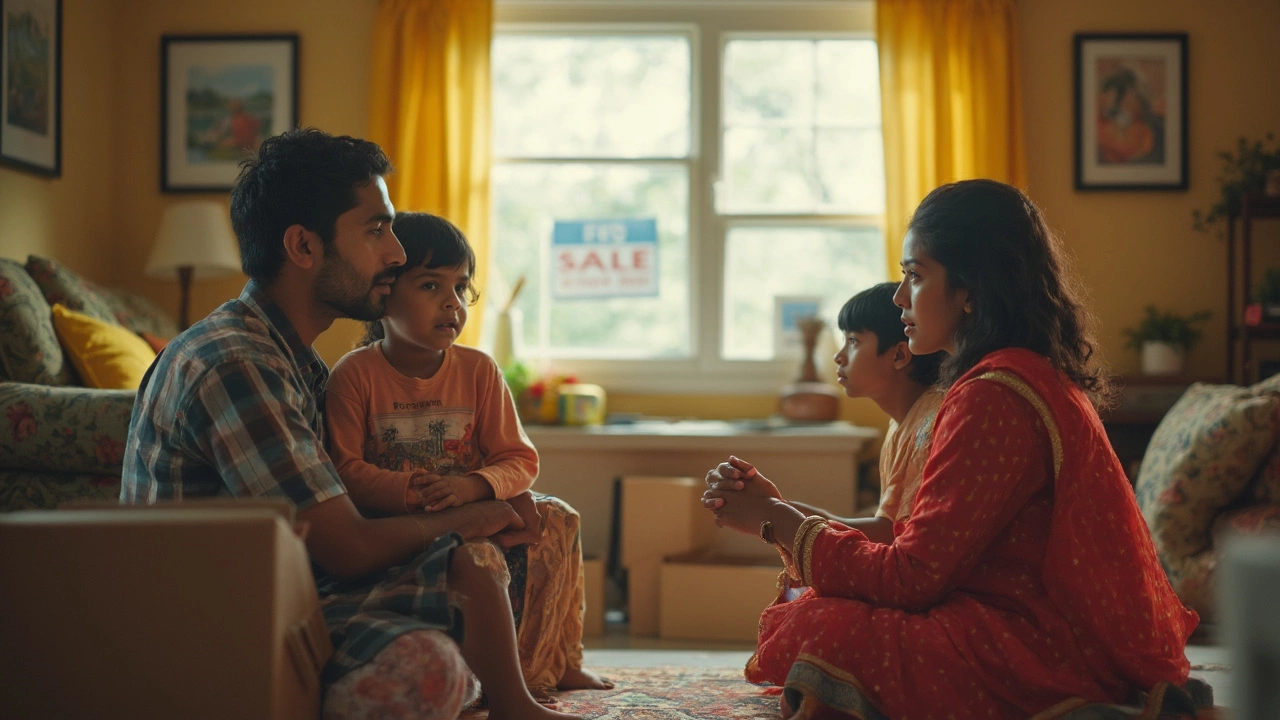Imagine waking up to a message from your landlord: "Thinking about selling the house." If you're renting in Virginia, that can stir up more stress than a leaky faucet. Can they actually just sell the place while you’re still living there? Short answer: Yes, but there are a bunch of rules in play—and as a tenant, you’ve got more rights than you might think.
Your lease is your first line of defense. Even if the landlord finds a buyer, your lease doesn’t simply disappear. The new owner usually has to honor whatever agreement you and the previous landlord signed, whether it’s for another month or another year. So, you can take a breath—at least for now.
- The Basics: Can a Landlord Sell While You're Renting?
- What Happens to Your Lease?
- Notice Rules for Tenants in Virginia
- Dealing with Showings and Inspections
- What If You Want to Leave Early?
- Tips for Protecting Yourself
The Basics: Can a Landlord Sell While You're Renting?
If you’re renting in Virginia, the straight-up answer is yes—your landlord totally can sell the house even while you’re living in it. Owning a property means your landlord has the right to put it on the market, whether you’re halfway through your lease or reaching the last month. Plenty of folks panic at the idea, but it’s actually a pretty routine thing across the state.
What’s important to know is that Virginia law doesn’t make your landlord wait for your lease to end before selling. They don’t even need your permission to list the property. The sale is all about transferring ownership of the house itself, not about forcing you out the door the same week a 'For Sale' sign pops up.
In a lot of Virginia cities, rental homes are just as likely to be bought and sold as any regular house. According to data from the Virginia Association of Realtors in 2024, around 14% of home sales involve properties with active tenants. Basically, it’s more common than you might think.
Here’s what the process usually looks like:
- The landlord decides to sell and hires a real estate agent.
- The property is listed for sale, usually as a "tenant-occupied investment opportunity" or something similar.
- Realtors may arrange showings, often needing to give you notice before stopping by with buyers (more on those rules later).
- If a buyer picks up the property, the sale transfers ownership—but it doesn’t automatically kick you out, thanks to your house rent agreement.
So, while the landlord holds most of the cards about selling, being a renter gives you certain protections. Next up, let’s break down exactly what happens to your Virginia lease when the home you’re renting changes hands.
What Happens to Your Lease?
This is where things usually get confusing for Virginia renters. If your landlord sells the house while you’re living in it, your Virginia lease agreement doesn’t just vanish overnight. Here’s the simple truth: a signed house rent agreement is still valid after the property changes hands. The new owner essentially steps into your old landlord’s shoes.
If you’re on a fixed-term lease (like a 12-month deal), the incoming owner has to honor every single term—rent price, end date, and all the nitty-gritty. Only once your lease actually expires can they change the terms or ask you to move. But if you’re on a month-to-month lease, things move a bit faster: the new owner can give you the legal notice (usually 30 days in Virginia) to end your rental.
Check out what usually happens:
- If you have months left on your lease, you’re good until it’s up. No one can just kick you out because the house got sold.
- For a month-to-month lease, the new landlord can give proper written notice and then you’d have to move after that period.
And here’s a tip no one tells you: Always keep a copy of your lease handy, whether it’s printed or somewhere in your inbox. If there’s a dispute, you’ll need proof of the exact terms. Don’t just take your landlord’s word for it.
Renting in Virginia means you’re protected more than you might think. Remember, selling a property doesn’t give the landlord—old or new—the right to ignore your agreement.
Notice Rules for Tenants in Virginia
If your landlord wants to sell the place you’re renting in Virginia, they can’t just turn around and toss an eviction notice out of the blue. The law is pretty straightforward here—how much heads-up you get depends on your lease.
If you have a fixed-term lease (like a 12-month deal), the new owner usually has to let you finish it out. No random eviction, even if they want to move in or flip the property. With a month-to-month renting setup, it’s different. Either the landlord or the new owner only needs to give you 30 days’ written notice to end the lease—no fancy excuses required.
- For month-to-month leases: 30 days’ written notice, minimum.
- For year-long/fixed leases: Your lease rules until it ends, unless you agree in writing to leave earlier.
If you’ve lived in the home for more than a year, Virginia law still doesn’t require more than 30 days’ notice for non-renewal. The rules don’t magically extend because you've been there a long time.
Also, if the landlord wants to show the house to buyers, they’ve got to give you at least 24 hours’ notice—no surprise visits. And all this has to be in writing. Phone calls or casual texts aren’t enough by law here. Keep all communication, just in case you need to prove the timing later.
| Type of Lease | Minimum Written Notice to End Lease in Virginia |
|---|---|
| Month-to-Month | 30 days |
| Year/Fixed Lease | Until lease ends |
If your landlord tries to ignore these notice rules, you don’t have to just take it. You’re protected under Virginia’s landlord-tenant laws. If things get sketchy, you can contact legal aid or the Virginia Department of Housing—people really do win these cases.

Dealing with Showings and Inspections
When your landlord puts the home up for sale, expect that real estate agents will want to parade buyers through your space. In Virginia, they can’t just show up out of the blue. State law says a landlord must give you at least 24 hours' notice before anyone comes inside for a showing, inspection, or appraisal. Unless you agree to something else, the notice has to be written—text or email counts, so keep an eye out for messages.
You’re not stuck dropping everything last minute. If the timing doesn’t work (say you have night shifts or small kids), have a straight-up chat with your landlord about what hours are reasonable. Most tenants work out a defined schedule—like weekday evenings or Saturday afternoons—so it doesn’t wreck your whole week. And reminder: you never have to let them in at 7 a.m. or 10 p.m.—that’s just not reasonable.
Landlords can’t let themselves in without your OK, unless there’s an emergency. Virginia law backs you up here. And if people do come in, your stuff and privacy are still protected. You don’t have to leave during the showings, but most buyers expect tenants to be scarce. Your call.
To keep things simple, here’s what usually happens:
- Your landlord (or their agent) texts or emails at least 24 hours in advance.
- You agree on a viewing time that works for both sides.
- The showing happens, and you can stay or go—it’s up to you.
- If the schedule isn’t working, you can ask for a change. And you’re not being a pain—it’s your right.
Here’s a quick breakdown on what your landlord can and can’t do when selling your rented house in Virginia:
| Allowed | Not Allowed |
|---|---|
| Give proper notice for showings | Randomly show up unannounced |
| Work with you to set reasonable hours | Insist on early mornings or late nights |
| Enter with your permission (except emergencies) | Let agents or buyers in without permission |
Save every notice and make sure you’re in the loop any time someone wants to enter. If a landlord gives keys to a stranger or blows off the notice rule, you’re well within your rights to say no or file a complaint. The law’s on your side, so don’t let anyone walk all over your living space just because the landlord is selling the house.
What If You Want to Leave Early?
This situation gets tricky fast. If your house rent agreement in Virginia is for a fixed term, like a one-year lease, you usually can’t just pack up and go because your landlord is selling the house. The sale itself doesn’t freeze or void your lease. But what if the change has you wanting out?
Bottom line: Unless your lease specifically says you can break it if the landlord sells, you’re still on the hook. Virginia lease laws don’t give tenants an automatic out just because the home is on the market or has a new owner. If you break the lease on your own, you’re likely responsible for rent until the end or until the place is re-rented—whichever happens first.
Always check your rental agreement for any ‘early termination’ clause. Some landlords include a buy-out option: pay a penalty (like two months’ rent), give notice, and move out without more hassle. If it’s not in your lease, you may have to negotiate. Sometimes landlords will work with you, especially if having a tenant crowds their showings or slows the sale.
- Read your full lease twice—don’t skip the fine print.
- If you want to leave, ask your landlord in writing first. Get any deal confirmed by email or text, just to be safe.
- If your place rents fast to a new tenant, you might only owe for the gap, not the whole lease.
- Document everything—Virginia is big on written agreements and proof.
A lot of folks want to know if there are stats on tenants leaving early in these situations. While clear numbers on Virginia aren’t always published, national landlord-tenant data shows that less than 15% of renters successfully break leases early after a sale—mostly because of strict agreements. So, don’t count on a free pass.
Tips for Protecting Yourself
If you’re suddenly caught up in a situation where your landlord selling house becomes more than just a rumor, you want to make sure you don’t get steamrolled. Here’s how to keep yourself covered while renting in Virginia.
- Get everything in writing. If your landlord mentions selling, ask for details in writing. Email works fine. If anything changes—like the owner wants to show the place—confirm dates and get written notice every time. This protects you if there’s a misunderstanding.
- Review your lease—seriously. Pull it out and look for any section about selling, early termination, or what happens if the property changes hands. Some leases have clauses that give buyers more leeway, others lock in your rights. Don’t just take your landlord’s word for it.
- Know your notice rules. In Virginia, your landlord generally has to give 24 hours’ notice before showing your home to a buyer. If someone barges in without warning, you can call them out on it, because that’s not legal under the Virginia Residential Landlord and Tenant Act.
- Document everything. When buyers or agents start touring your home, do a quick video walk-through before and after. If something gets damaged, you’ve got proof it wasn’t you.
- Check your security deposit rights. A new owner becomes responsible for your security deposit if the house sells. Get confirmation from both the old and new owners of where your deposit stands. If you don’t get clear answers, you can ask for proof—the law is on your side.
- Don’t get pressured to move early. Even if the new owner “wants to move in right away,” you don’t have to leave before your lease ends unless you both agree. If you’re on a month-to-month, you’re owed proper written notice—usually 30 days.
- Talk to a local expert. If stuff gets messy, or you think your rights are being ignored, shoot a quick email to a local tenant council or housing attorney. Plenty of them do free consultations.
| Required Notice for Showings | Security Deposit Transfer | Early Termination Rights |
|---|---|---|
| 24 hours minimum | Must be transferred to new owner with written receipt | Not allowed unless written in lease or agreed otherwise |
Don’t just cross your fingers and hope for the best when your landlord selling house news drops. Know your rights, lean on your paperwork, and keep your communication clear. If you’re proactive, you’ll ride out the sale without losing sleep or forfeiting your deposit.





